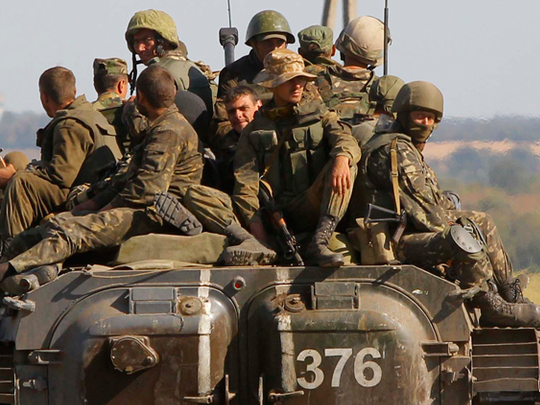
Dubai: Ukraine’s pro-Western president is accusing Moscow of waging “direct and unconcealed aggression” amid signs that his country’s army has lost ground to Russian-backed separatist forces in the industrial eastern regions.
“Direct and unconcealed aggression has started against Ukraine from the side of our neighbouring country,” Petro Poroshenko told journalists on Monday.
“This has changed the root of the situation in the zone of battles ... with it our fighting structures are now facing new and more difficult circumstances,” he added.
Poroshenko’s comments came a day after Vladimir Putin, Russia’s president, raised fears that he intended to partition Ukraine by calling for negotiations on “statehood” for Russian-speaking south-eastern regions of the country.
Poroshenko promised to shake up Ukraine’s military leadership as government forces lost ground and allowed pro-Russian militants to open a new southern front by seizing Novoazovsk, an Azov Sea coast border town in the south-eastern corner of Ukraine.
The unexpected advance — which some locals in Novoazovsk say came from nearby Russian territory — put Kiev on the back foot. It appears to have reversed weeks of gains made against rebels further north using the provincial capitals of Donetsk and Lugansk as strongholds.
Speaking on television on Sunday evening, Valeriy Geletey, Ukraine’s defence minister, claimed forces fighting in the regions of Donetsk, Lugansk and Novoazovsk were increasingly facing regular Russian troops embedded with separatist militants.
Russia’s foreign minister, Sergei Lavrov, has said negotiations taking place in Minsk to resolve the crisis in eastern Ukraine should seek an immediate ceasefire.
Lavrov added that Ukrainian forces must pull back from positions from which they can hit civilians.
“They must leave positions from which they can harm the civilian population,” Lavrov told students in Moscow on Monday. “I very much count on today’s negotiations being devoted above all to the task of agreeing an immediate ceasefire, without conditions.”
In Mariupol, two Ukrainian seamen were reported missing after an attack by separatist rebel artillery on a patrol boat in the Asov Sea. Eight seamen had been rescued, a Ukrainian border guard official said on Monday
Putin urged the EU on Monday to show “common sense” and not to engage in mutually destructive sanctions, in his first reaction to the threat of additional punitive measures over Ukraine.
“I hope that common sense will prevail, ... that we will work together normally and that we and our partners will not cause harm by poking at one another,” Putin was quoted as saying by Russian news agencies during a visit to the eastern Siberian city of Yakutsk.
The remarks came a day after European Union leaders gave Russia a week to reverse course in Ukraine or face a new round of sanctions.
Fears are growing that the confrontation could engulf the whole continent after Russia allegedly sent troops to back a new offensive by pro-Kremlin rebels in southeastern Ukraine.
Russian officials have said previously that they were preparing countermeasures in case of new Western sanctions, after having last month banned most EU and US food imports.
Previous sanctions, which targeted Kremlin-linked figures and limited access of state-controlled banks and companies to Western financial markets, have not had a severe impact nor swayed Russian policy.
The threat of sanctions, however, sent sentiment plunging and sparked a surge in capital flight that has starved the Russian economy of the investment it needs and brought it to the brink of recession.
This time the Russian market is concerned over the possibility that banks could be excluded from the SWIFT system for international financial transactions as part of the next EU sanctions, which officials are to elaborate during the course of this week.
Banning Iran from the system in 2012 damaged the country’s economy but is widely seen as having helped bring the Islamic Republic back to the negotiating table regarding its contested nuclear programme.
“If that does in fact take place, of course a significant part of Russian banks’ foreign transactions will simply be paralysed,” former economy minister Andrei Nechayev said on Moscow Echo radio over the weekend.
But the financial commentator for Russia24 TV warned that the measure is a double-edged sword.
“If you take into account that trade in oil and gas is done in dollars then being cut off from SWIFT then there will immediately be serious problems in making payments for those strategic goods, which are also important for the West,” he said.
— Compiled from agencies












